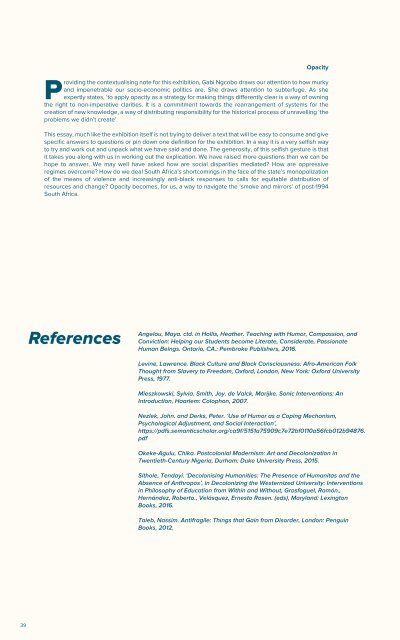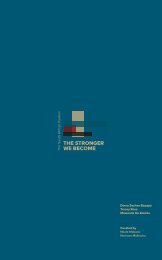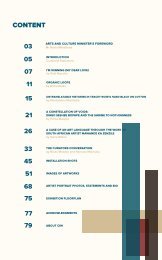The-Stronger-We-Become-Catalogue
Create successful ePaper yourself
Turn your PDF publications into a flip-book with our unique Google optimized e-Paper software.
Opacity<br />
Providing the contextualising note for this exhibition, Gabi Ngcobo draws our attention to how murky<br />
and impenetrable our socio-economic politics are. She draws attention to subterfuge. As she<br />
expertly states, ‘to apply opacity as a strategy for making things differently clear is a way of owning<br />
the right to non-imperative clarities. It is a commitment towards the rearrangement of systems for the<br />
creation of new knowledge, a way of distributing responsibility for the historical process of unravelling ‘the<br />
problems we didn’t create’.<br />
This essay, much like the exhibition itself is not trying to deliver a text that will be easy to consume and give<br />
specific answers to questions or pin down one definition for the exhibition. In a way it is a very selfish way<br />
to try and work out and unpack what we have said and done. <strong>The</strong> generosity, of this selfish gesture is that<br />
it takes you along with us in working out the explication. <strong>We</strong> have raised more questions than we can be<br />
hope to answer. <strong>We</strong> may well have asked how are social disparities mediated? How are oppressive<br />
regimes overcome? How do we deal South Africa’s shortcomings in the face of the state’s monopolization<br />
of the means of violence and increasingly anti-black responses to calls for equitable distribution of<br />
resources and change? Opacity becomes, for us, a way to navigate the ‘smoke and mirrors’ of post-1994<br />
South Africa.<br />
References<br />
Angelou, Maya. ctd. in Hollis, Heather. Teaching with Humor, Compassion, and<br />
Conviction: Helping our Students become Literate, Considerate, Passionate<br />
Human Beings. Ontario, CA.: Pembroke Publishers, 2016.<br />
Levine, Lawrence. Black Culture and Black Consciousness: Afro-American Folk<br />
Thought from Slavery to Freedom, Oxford, London, New York: Oxford University<br />
Press, 1977.<br />
Mieszkowski, Sylvia. Smith, Joy. de Valck, Marijke. Sonic Interventions: An<br />
Introduction, Haarlem: Colophon, 2007.<br />
Nezlek, John. and Derks, Peter. ‘Use of Humor as a Coping Mechanism,<br />
Psychological Adjustment, and Social Interaction’,<br />
https://pdfs.semanticscholar.org/ca9f/5151a75909c7e72bf0110a56fcb012b94876.<br />
pdf<br />
Okeke-Agulu, Chika. Postcolonial Modernism: Art and Decolonization in<br />
Twentieth-Century Nigeria, Durham: Duke University Press, 2015.<br />
Sithole, Tendayi. ‘Decolonising Humanities: <strong>The</strong> Presence of Humanitas and the<br />
Absence of Anthropos’, in Decolonizing the <strong>We</strong>sternized University: Interventions<br />
in Philosophy of Education from Within and Without, Grosfoguel, Ramón.,<br />
Hernández, Roberto., Velásquez, Ernesto Rosen. (eds), Maryland: Lexington<br />
Books, 2016.<br />
Taleb, Nassim. Antifragile: Things that Gain from Disorder, London: Penguin<br />
Books, 2012.<br />
39




